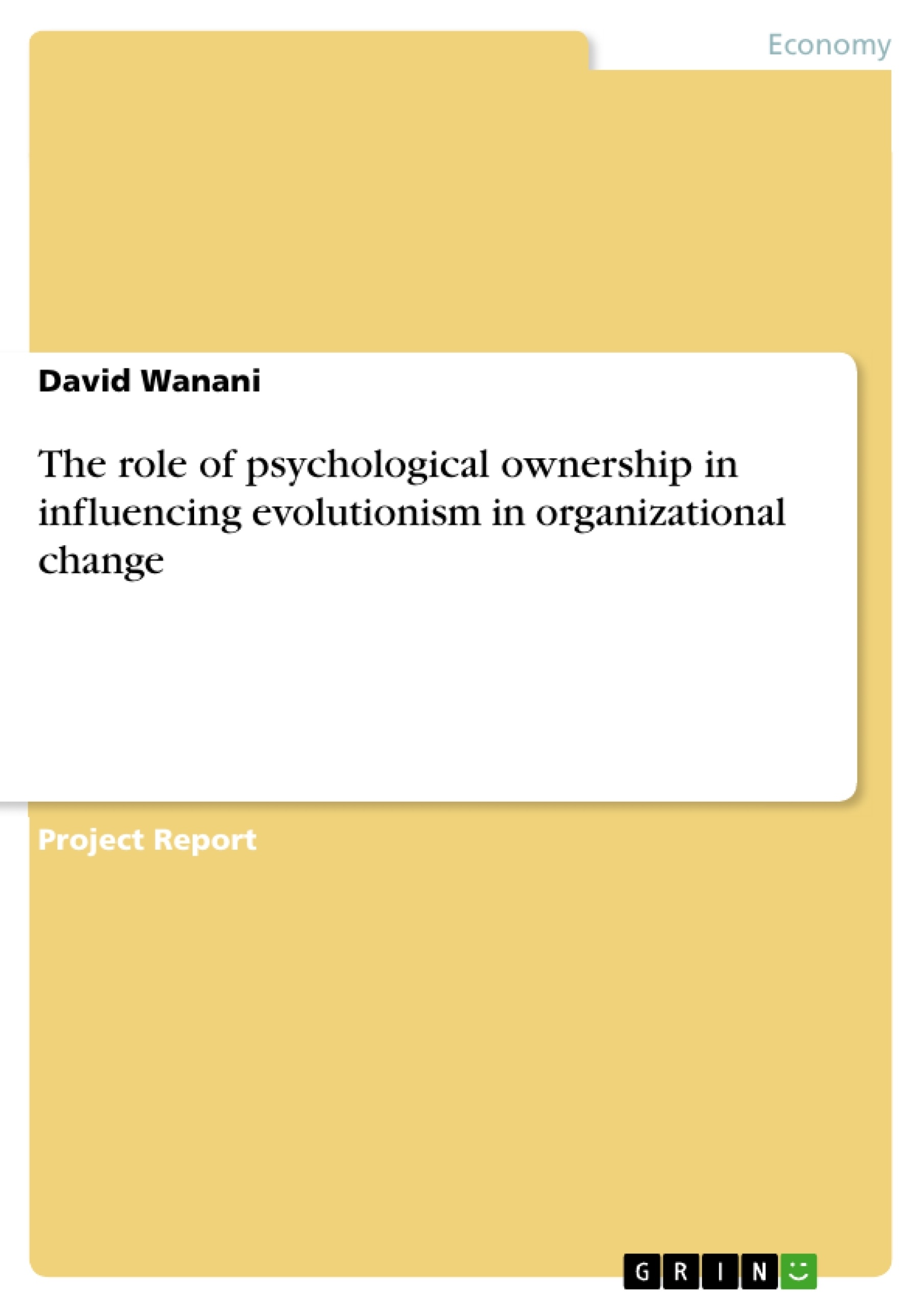The experience of failure in most organzational changes call for another in facilitating it in a cordially manner. Psychological ownership has been explained as one of the influences potentially bringing about evolutionism in organizational changes. Thus, research at a university in Tanzania strived to explore such influence and, if useful, the set backs in organizational changes may have been solved.
In that aim, the focus of the research has been centered on solving the current problem rather than a problem probing. Using a triangulation method through questionnaires, interviews, focus group discussions and secondary dat,a a sample of 50 workers gave the results that have been used qualitatively to describe some phenomenon important in revampling organizational changes.
These results have shown that psychological ownership can positively influence organizational changes. However since organizational changes is a continuous thing in contemporary business, likewise on the same parameter some researches need also to be continuous.
Inhaltsverzeichnis (Table of Contents)
- Introduction
- Background
- The Problem to the Study
- Research Objectives
- Scope of this Study
- Justification for this Study
- Methodology
- Conceptual Analysis
- Organizations
- Change
- Evolution and Evolutionary Change
- Organizational Change
- Psychological Ownership
- Theoretical Reviews on Organizational Change
- Reviews on Organizational Change Models
- Reviews on Trends in Organizational Changes and the Gap in Literatures
- Reviews on Some Notable Challenges toward Organizational Changes
- Findings and Discussions on Strategizing Organizational Changes
- Conclusive Remarks on Organizational Changes
- References
Zielsetzung und Themenschwerpunkte (Objectives and Key Themes)
This research investigates the influence of psychological ownership on the successful implementation of evolutionary organizational change, aiming to address the high failure rate observed in such programs. The study focuses on a Tanzanian university and utilizes a triangulation method involving questionnaires, interviews, focus group discussions, and secondary data to explore the relationship between psychological ownership and organizational change.
- The challenges and high failure rates associated with organizational change initiatives
- The role of psychological ownership in fostering positive organizational changes
- The impact of psychological ownership on employee commitment, loyalty, and participation
- Exploring the significance of a broader stakeholder approach, particularly from the grassroots, in driving successful organizational change
- The importance of adaptive and evolutionary change strategies to enhance organizational agility and sustainability
Zusammenfassung der Kapitel (Chapter Summaries)
The introduction sets the context for the research by highlighting the frequent failure of organizational change initiatives and the need for alternative approaches. It discusses the historical example of Ujamaa in Tanzania and its failure as a top-down, leader-driven change program. The chapter also explores the negative consequences of unsuccessful change, including employee burnout and resistance. The chapter concludes by introducing the concept of psychological ownership as a potential solution for facilitating successful organizational change.
Chapter 2 provides a conceptual analysis of key terms, including organizations, change, evolution, organizational change, and psychological ownership. This chapter lays the foundation for understanding the theoretical underpinnings of the research.
Chapters 3, 4, 5, and 6 delve into various theoretical frameworks, models, and trends in organizational change, examining the gap in existing literature and identifying notable challenges in implementing change initiatives. These chapters provide a comprehensive overview of the current state of knowledge on organizational change, setting the stage for the research findings presented in subsequent chapters.
Chapter 7 presents the findings and discussions on strategizing organizational change, drawing on the data collected from the Tanzanian university study. This chapter explores the relationship between psychological ownership and employee perceptions, attitudes, and behaviors toward organizational change, shedding light on the key factors contributing to successful change implementation.
Schlüsselwörter (Keywords)
This research focuses on the key concepts of psychological ownership, organizational change, loyalty, affection, commitment, participation, and stakeholder engagement. It explores the application of these concepts to address the challenges of organizational change and to foster a more adaptive and evolutionary approach to organizational development.
What is "Psychological Ownership" in organizations?
It refers to the state in which employees feel as though their target of ownership (like a project or company) is theirs, increasing commitment.
How does it influence organizational change?
Psychological ownership can positively drive evolutionary change by fostering employee loyalty, participation, and reducing resistance.
Why do many organizational changes fail?
Failures are often due to top-down approaches that ignore grassroots stakeholders, leading to burnout and lack of commitment.
What was the focus of the study in Tanzania?
The research explored how psychological ownership could revamp change processes at a university using a triangulation of questionnaires and interviews.
What is "Evolutionary Change"?
It is a continuous, adaptive process of development rather than a one-time disruptive event, aimed at long-term sustainability.



